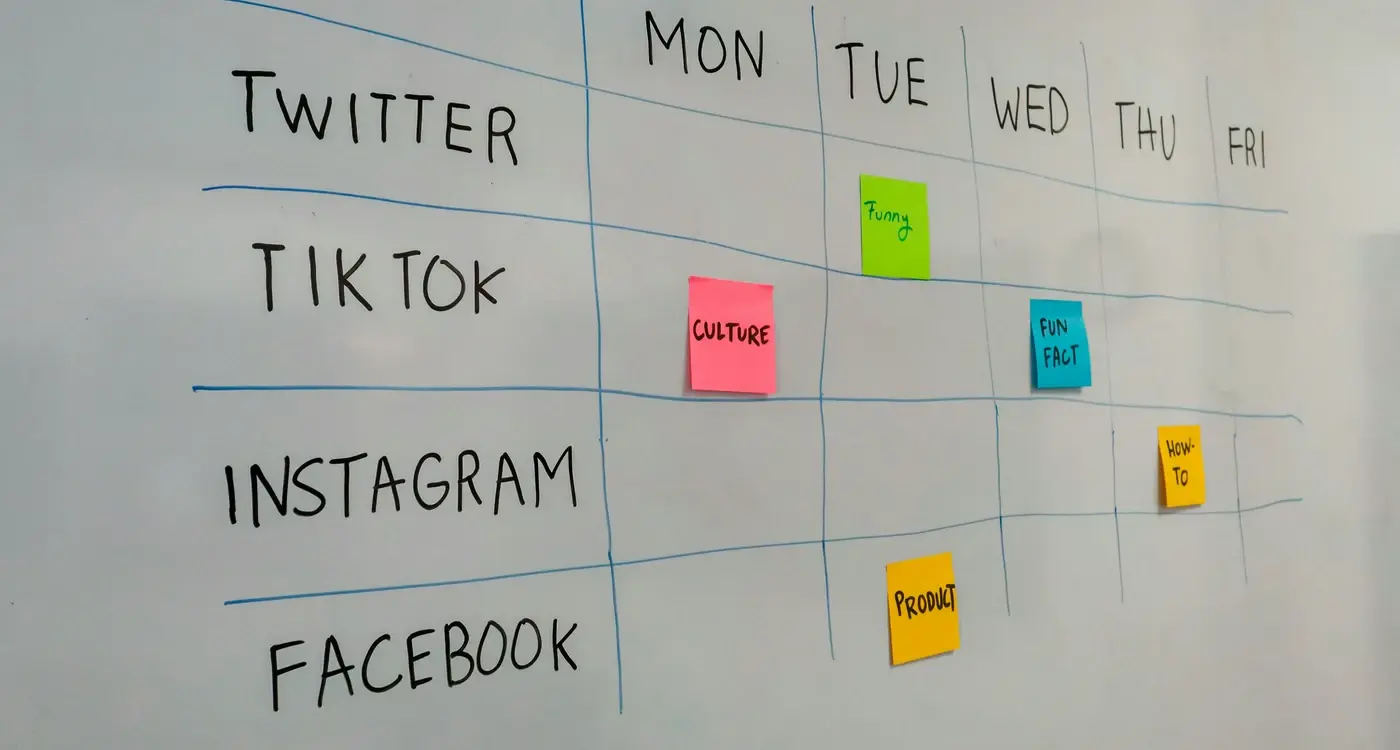Launching a mobile app is a bit like preparing for a big party - you want everyone to show up and have a brilliant time. But with millions of apps competing for attention in today's crowded marketplaces, having a solid app marketing strategy isn't just helpful - it's essential for success.
Success in the app market isn't about being the loudest voice in the room; it's about being the most relevant voice in the right room
After working with hundreds of app launches, we've seen firsthand how proper mobile app promotion can make the difference between an app that soars and one that struggles to find its feet. Think about it - even the most innovative app won't make an impact if no one knows it exists.
The good news? You don't need a massive budget or a Fortune 500 marketing team to effectively promote your app. What you do need is a well-thought-out strategy and the right mix of marketing tactics that work together to reach your target audience.
In this guide, we'll walk you through 10 proven marketing tactics that can help your app stand out in today's competitive landscape. Whether you're a startup founder launching your first app or an established business expanding into mobile, these strategies will help you build buzz, attract users, and create momentum for your app launch.
From building pre-launch excitement to optimising your app store presence, we'll cover everything you need to know to get your app the attention it deserves. Let's dive in and explore how to make your app launch a smashing success.
Build a Strong Pre-Launch Strategy
Getting ready to launch your mobile app can feel like preparing for a grand opening of a restaurant - you wouldn't dream of opening the doors without having your menu perfected and your staff trained. The same principle applies to your app launch, and a well-thought-out pre-launch strategy is your recipe for success.
Start Early, Start Strong
We've found that successful app launches typically begin their pre-launch activities at least 3-4 months before the actual release date. Think of it as building anticipation for a blockbuster film - you want people talking about your app before it's even available.
Begin by creating a detailed timeline that maps out all your marketing activities. This should include setting up a landing page for your app (something we've seen drive up to 40% more initial downloads), creating teaser content, and establishing your social media presence.
Build Your Marketing Foundation
Just as you wouldn't build a house without laying proper foundations, your app needs solid marketing groundwork. Start collecting email addresses through your landing page, build relationships with potential reviewers and influencers, and create a content bank of videos, screenshots, and promotional materials.
A particularly effective approach we've observed is running a beta testing programme. Not only does this help iron out any technical wrinkles, but it also creates an initial group of engaged users who can become your app's first advocates. Think of them as your app's founding members - their feedback and support can be invaluable.
Remember, your pre-launch phase isn't just about marketing - it's about building a community around your app before it even hits the stores.
Optimise Your App Store Listing
Think of your app store listing as your app's digital storefront - it's often the first impression potential users will have of your creation. Just as you wouldn't open a high street shop with dusty windows and unclear signage, your app store presence needs to be polished and inviting.
Essential Elements for App Store Success
Start with a compelling app title that includes your main keyword naturally - remember, it needs to make sense to humans first, search algorithms second. Your app description should tell a story, highlighting the problems your app solves and its unique benefits. Think of it like writing a friendly letter to someone who's never heard of your app before.
Screenshots and videos are your silent salespeople. We've found that showing your app in action, with clear captions highlighting key features, can dramatically improve your mobile app promotion efforts. Just like how estate agents use the best photos to showcase a property, your visual assets should present your app in its best light.
Keywords and Localisation
As part of your app marketing strategy, carefully research and select relevant keywords that your target audience actually uses. Remember to localise your listing for different markets - what works in Birmingham might not resonate in Berlin. Consider cultural nuances and local language variations in your descriptions and screenshots.
Create an A/B testing schedule for your app store elements. Test different screenshots, descriptions, and icons every few weeks to find what resonates best with your audience. Just remember to change only one element at a time to accurately measure impact.
Keep your listing fresh by regularly updating it with new features, seasonal content, and user testimonials. This shows potential users that your app is actively maintained and cared for - much like a well-tended garden that keeps blooming season after season.
Create Engaging Social Media Content
Social media is where your future users spend countless hours scrolling, sharing and engaging with content. It's the perfect platform to build buzz around your app launch, but simply posting "download our app" messages won't cut it. Let's explore how to create content that truly resonates with your audience.
Think of social media content like having a conversation at a party - you wouldn't just talk about yourself, would you? Instead, focus on creating value for your followers through entertaining, educational, or inspiring content that relates to your app's purpose.
Essential Content Types for Your Social Media Mix
- Behind-the-scenes glimpses of your app development journey
- Short video tutorials showcasing key features
- User-generated content and success stories
- Polls and questions to encourage engagement
- Relevant industry news and tips
- Sneak peeks of upcoming features
Remember those popular 'expectation vs reality' memes? Consider creating similar relatable content that highlights common problems your app solves. For instance, if you're launching a fitness app, share amusing workout mishaps alongside how your app prevents them.
Cross-platform consistency is crucial, but adjust your tone for each platform. LinkedIn users might appreciate detailed insights into your app's development, while TikTok audiences might prefer quick, entertaining demonstrations. The key is maintaining your brand voice whilst speaking the language of each platform.
Most importantly, engage with your audience. Respond to comments, participate in discussions, and build genuine relationships. After all, social media is about being social!
Partner with Relevant Influencers
When it comes to mobile app promotion, influencer partnerships can be a game-changer. Think of influencers as trusted friends who recommend great products to their followers - their words carry weight and authenticity that traditional advertising simply can't match.
Influencer marketing isn't about finding someone with the most followers; it's about finding someone whose audience perfectly matches your app's target users.
Finding the Right Match
Start by identifying influencers whose content aligns with your app's purpose. If you've developed a fitness app, for instance, partnering with health and wellness influencers makes perfect sense. Look beyond follower counts - engagement rates and audience demographics are far more important for your app marketing strategy.
Building Authentic Partnerships
The most successful influencer collaborations happen when there's genuine enthusiasm for your app. Consider sending early access to potential partners, allowing them to naturally experience and share your app's benefits. This approach often leads to more authentic content that resonates with their audience.
Remember to brief your influencer partners thoroughly about your app's key features and benefits, but give them creative freedom in how they present it. Their followers trust them because of their unique voice and style - trying to control their message too tightly could make the promotion feel forced and inauthentic.
Pro tip: Don't forget about micro-influencers! While they may have smaller followings, their engagement rates are often higher, and their audiences tend to be more targeted. Sometimes, partnering with several micro-influencers can be more effective than working with one major influencer.
Launch an Email Marketing Campaign
Email marketing remains one of the most powerful tools in your app launch arsenal, offering a direct line of communication with potential users. At Glance, we've seen countless successful app launches supercharged by well-crafted email campaigns that build anticipation and drive downloads.
Building Your Email Strategy
Think of your email campaign as telling a story about your app, much like how J.K. Rowling built excitement for each new Harry Potter book release. Start by collecting email addresses through a pre-launch landing page, offering exclusive perks or early access to those who sign up.
- Create a compelling welcome email series introducing your app's key features
- Send regular updates about development progress and launch countdown
- Offer early-bird incentives like premium features or exclusive content
- Share behind-the-scenes glimpses of your app development journey
- Include clear calls-to-action for pre-registration or download
Maintaining Engagement
Remember to keep your emails concise and valuable. Nobody wants to wade through paragraphs of technical jargon - instead, focus on how your app will make users' lives better or solve their problems. We've found that personalised emails with user-specific content typically see engagement rates up to 3x higher than generic broadcasts.
Don't forget to segment your email list based on user interests or behaviour. For instance, if you're launching a fitness app, you might send different content to running enthusiasts versus yoga practitioners. This targeted approach helps ensure your messages resonate with each specific audience group.
Implement App Store Advertising
Let's face it - even the most brilliant mobile app can get lost in the sea of millions of other apps without proper visibility. That's where app store advertising comes in as a crucial part of your mobile app promotion strategy.
Both Apple's App Store and Google Play Store offer powerful advertising platforms that help your app reach potential users right when they're actively looking for solutions. Think of it as having a friendly shop assistant pointing customers directly to your product!
Setting Up Your App Store Ads
To make the most of your app store advertising campaigns, you'll want to focus on these key elements:
- Keyword targeting: Choose terms your potential users actually search for
- Competitor targeting: Show up when users search for similar apps
- Category targeting: Appear in relevant app store categories
- Custom audience targeting: Reach users based on their interests and behaviours
- Budget management: Start small and scale based on performance
Remember to create different ad sets for each store - what works brilliantly on iOS might need tweaking for Android users. It's like serving different dishes to suit different tastes!
When setting up your first app store advertising campaign, start with a small daily budget (around £20-30) and test different ad variations for at least two weeks before making major adjustments.
Most importantly, ensure your app store listing is fully optimised before pumping money into advertising. There's no point driving traffic to a poorly presented app page - it's like inviting guests to a party before decorating the venue!
Generate Press Coverage and Reviews
Getting the media to notice your app can feel like trying to be heard in a crowded stadium, but with the right approach, you can cut through the noise and grab their attention. The key is to craft a compelling story that journalists and reviewers simply can't ignore.
Crafting Your Press Strategy
Start by building a targeted list of journalists and tech reviewers who cover mobile apps in your niche. Remember, personalisation is crucial - nobody likes receiving generic mass emails! Research their previous articles and engage with their work before reaching out. A thoughtful comment about their recent piece will get you much further than a copy-pasted pitch.
Your press kit should include high-resolution screenshots, an engaging press release, and perhaps a short demo video. Make sure to highlight what makes your app unique - journalists receive dozens of pitches daily, so you'll need to explain why yours is worth their time.
Building Authentic Reviews
While it might be tempting to ask friends and family to flood your app with five-star ratings, authentic reviews from real users are worth their weight in gold. Consider reaching out to beta testers who genuinely enjoyed your app and kindly ask them to share their honest thoughts. You might also want to connect with app review websites and YouTube channels that specialise in app reviews - they often have dedicated audiences who trust their recommendations.
Remember, negative reviews aren't always bad news. They show authenticity and provide valuable feedback for improvement. Respond professionally to all reviews, whether positive or negative, showing that you're actively engaged with your user community and committed to making your app better.
Leverage Mobile App Communities
Building genuine connections within mobile app communities can be a powerful way to promote your app and gather valuable feedback. Think of these communities as friendly neighbourhood gatherings where developers, users, and enthusiasts come together to share their experiences and discoveries.
The strongest app marketing strategies often come from authentic engagement within communities where your target users already spend their time.
Finding Your Community Hub
Start by identifying where your potential users hang out online. Reddit, Product Hunt, and specialized forums related to your app's niche are excellent starting points. For instance, if you've developed a fitness app, communities like r/fitness or r/androidapps could become valuable platforms for your app marketing strategy.
Meaningful Engagement
The key to successful community engagement isn't just promoting your app - it's about becoming a valuable member of these spaces. Share your expertise, answer questions, and provide genuine value to other community members. Consider creating detailed posts about your development journey or hosting AMA (Ask Me Anything) sessions to build trust and interest.
Remember to follow each community's guidelines regarding mobile app promotion. Many forums have specific rules about self-promotion, and breaking these can harm your reputation. Instead, focus on building relationships first. When community members see you as a trusted contributor rather than just another marketer, they're more likely to take interest in your app and even become advocates for it.
Be prepared to receive honest feedback - both positive and constructive. These communities can provide invaluable insights for improving your app and refining your marketing approach. Plus, engaged community members often become your most loyal users and strongest word-of-mouth promoters.
Track and Analyse Your Marketing Results
After putting all that effort into marketing your mobile app, you'll naturally want to know what's working and what isn't. Think of it like being a detective - you need to gather clues about your marketing performance to make smart decisions moving forward.
Essential Metrics to Monitor
Start by tracking your key performance indicators (KPIs). These typically include download numbers, user retention rates, and cost per acquisition. But don't just collect numbers - look for the stories they tell. For instance, if you notice that users from Instagram are more likely to stick around than those from Facebook, you might want to adjust your social media strategy accordingly.
Making Data-Driven Decisions
Remember those marketing channels we discussed earlier? Each one should have its own set of metrics. Email campaigns should track open rates and click-throughs, while social media efforts should monitor engagement and conversions. It's like having a report card for each marketing activity.
Tools like Google Analytics for Mobile Apps, Firebase, or AppsFlyer can help you gather these insights. They're rather like having a crystal ball that shows you exactly how users are finding and interacting with your app. The key is to review these metrics regularly - we recommend weekly at first, then monthly once things stabilise.
Most importantly, don't be afraid to adjust your strategy based on what the data tells you. If something isn't working, it's perfectly fine to pivot. Marketing is rarely a 'set and forget' activity - it's more like tending a garden, where regular care and attention yield the best results.
Conclusion
Launching a mobile app is much like setting sail on a grand adventure - success depends on both careful planning and adaptable execution. We've explored various app marketing strategies that can help your application stand out in an increasingly competitive marketplace. From building anticipation before launch to maintaining momentum afterwards, each tactic plays a crucial role in your app's journey to success.
Remember that effective mobile app promotion isn't about implementing every possible marketing technique - it's about choosing the right combination of strategies that resonate with your target audience and align with your app's unique value proposition. Think of it as creating your own recipe for success, where each marketing ingredient needs to complement the others perfectly.
While these marketing tactics provide a solid foundation, don't be afraid to experiment and adapt your approach based on your analytics and user feedback. The mobile app landscape is constantly evolving, and what works brilliantly for one app might need tweaking for another. Stay flexible, keep testing new ideas, and always keep your users at the heart of your marketing efforts.
Above all, remember that successful app marketing is a marathon, not a sprint. It requires patience, persistence, and a willingness to learn and adapt. Whether you're launching a game, productivity tool, or innovative solution, these marketing strategies can help you build a strong presence in the app stores and connect meaningfully with your target users.
Now it's time to take these insights and craft your own app marketing strategy. Your app's success story is waiting to be written - and with the right approach to marketing, you're already several steps closer to achieving it.
Share this
Subscribe To Our Blog
You May Also Like
These Related Stories

Beyond the App Stores: Creative App Marketing Strategies That Actually Work

How Can I Promote My App?





